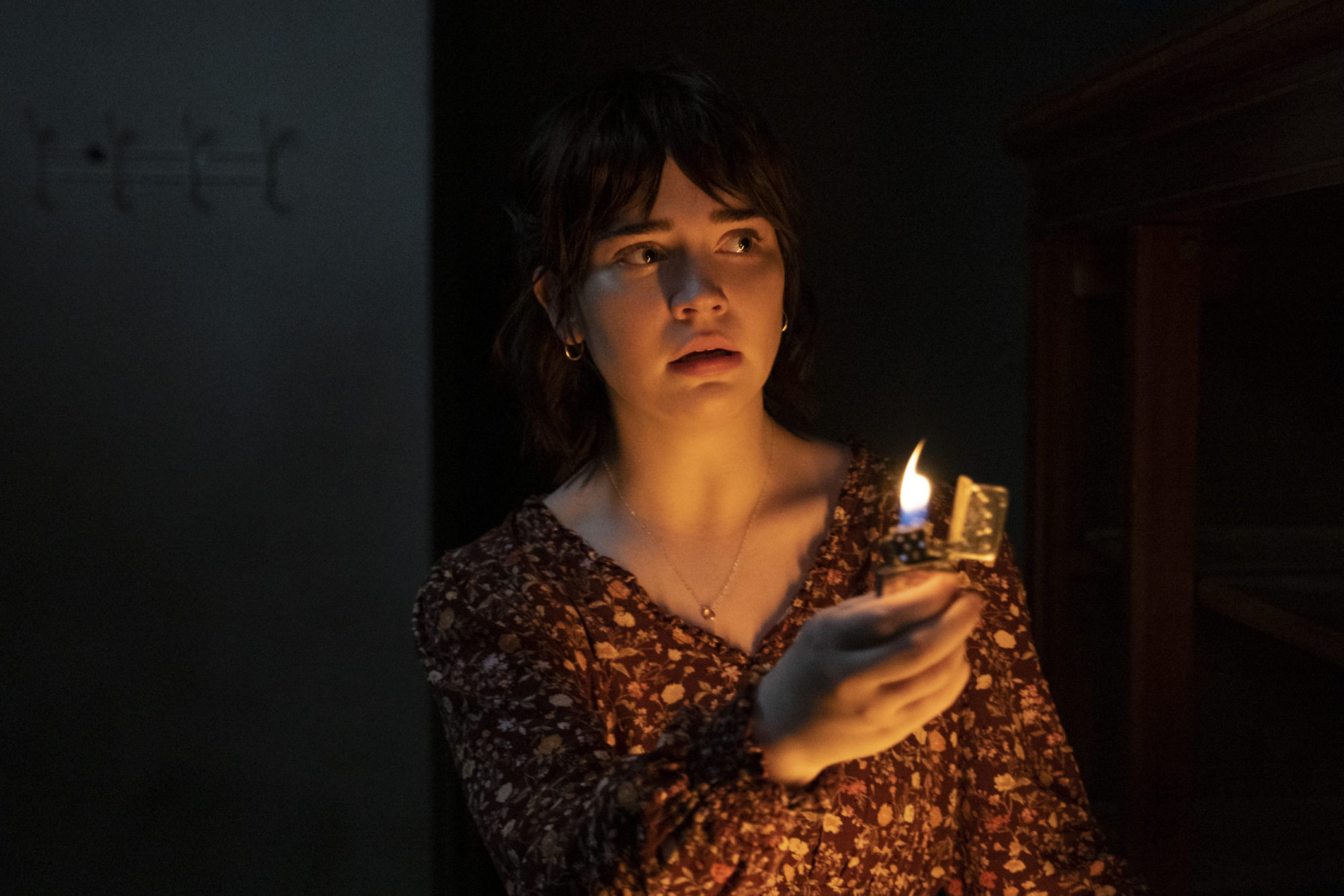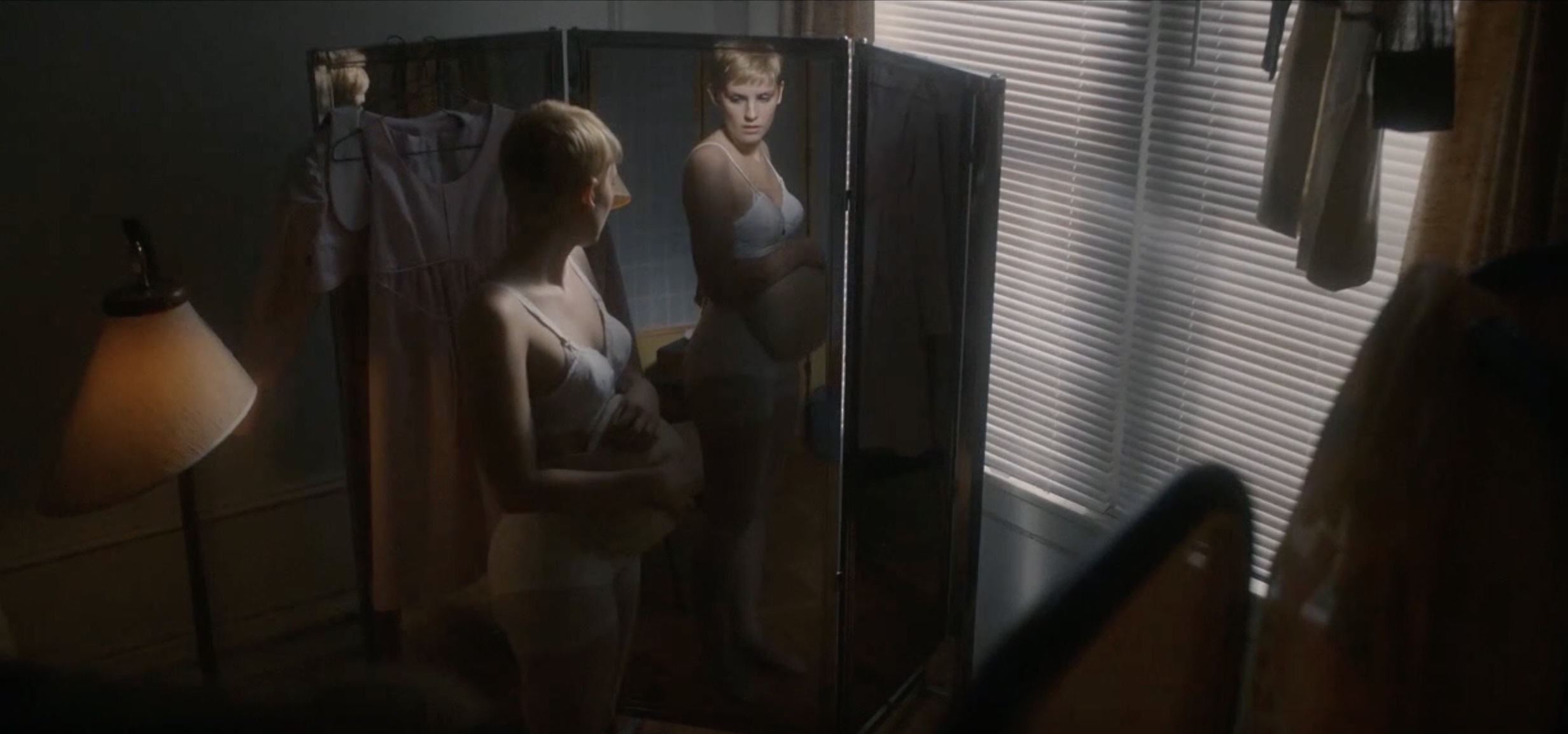Reviews
‘The Boogeyman’ Review – A Familiar Grief Metaphor Delivers on Potent Scares

The Boogeyman, directed by Rob Savage (Host) with a screenplay by Scott Beck & Bryan Woods (A Quiet Place, 65) and Mark Heyman (Black Swan), draws from Stephen King‘s 1973 short story of the same title. Rather than presenting a straightforward adaptation of King’s text, however, The Boogeyman uses its narrative as the film’s inciting event, acting as a spiritual sequel. While it never expands the mythology or story in any substantial way, this film adaptation is offset by Savage’s steadfast commitment to scares and a tremendous cast.
Sixteen-year-old Sadie (Sophie Thatcher) and her 10-year-old sister, Sawyer (Vivien Lyra Blair), struggle in the wake of their mother’s unexpected passing. That their father, therapist Will Harper (Chris Messina), seems emotionally closed off in his grief doesn’t help. The fractured family bonds grow even more precarious when a volatile new patient, Lester Billings (David Dastmalchian), unexpectedly arrives at Will’s home office asking for aid.
Letting him inside brings a world of horror as Lester leaves behind a malevolent presence eager to prey upon the Harper children.

(L-R): Sophie Thatcher as Sadie Harper and Vivien Lyra Blair as Sawyer Harper in 20th Century Studios’ THE BOOGEYMAN. Photo by Patti Perret. © 2023 20th Century Studios. All Rights Reserved.
One shocking opener pushes the PG-13 rating straightaway, driving Lester into the melancholic Harper household. Dastmalchian’s reliably captivating and emotional performance lays the early groundwork for the encroaching supernatural terror with an unsettling depiction of a man drowning from guilt and grief. This introductory sequence catches viewers up to speed on King’s original story, altering its conclusion to transfer its monstrous devourer of trauma to a household marred by it. Grief is the sustaining emotion throughout, and Sadie feels it most keenly. On that front, character arcs remain mostly a straight line as the Harper family tries to navigate the figurative and literal monsters lurking in the dark. How they engage with the encroaching threat reflects their various ways of coping with grief, from Will’s denial to Sadie’s increasing anger.
Rob Savage demonstrates a continued knack for scare crafting throughout, bringing no shortage of terrifying moments, jump scares, and unsettling dread as the Boogeyman entrenches itself further into the dark recesses of the Harper house. Savage manages to wring a freshness from even the most familiar scares with his use of light as an opposing force to darkness.
Sophie Thatcher makes a tremendous effort to sustain the high level of Sadie’s unrelenting terror, sorrow, and desperation. Sadie’s motherly affection toward younger sister Sawyer presents the backbone, and Vivien Lyra Blair’s palpable fear and precociousness solidify the audience’s allegiances for the family straight away. A scene-stealing Marin Ireland enters the equation at the right moment to liven up Sadie’s quest to understand what’s happening in her house, heralding the film’s most visually impressive action-heavy sequence.

Marin Ireland as Rita Billings in 20th Century Studios’ THE BOOGEYMAN. Photo by Patti Perret. © 2023 20th Century Studios. All Rights Reserved.
From there, The Boogeyman struggles to bring a thematically light story to a satisfying conclusion. A frightening foe gets reduced to another grief trauma metaphor thanks to intentionally broad and vague mythology, and the climax’s shaky-cam approach makes it tough to discern what’s happening on screen. As thrilling as the horror can be, the oversimplified story doesn’t offer much beyond connective tissue for the frights.
If you’re only looking for an excuse to sleep with a night light on, The Boogeyman offers a plethora of well-executed scares that linger. Savage and the talented cast take these characters with a severe seriousness that makes for an overly somber affair packed with goosebump-inducing chills. It’s the scares that audiences will remember most, though, as the barebones setup doesn’t build upon its core concept or forge new ground. Savage nails the fear, but the filmmaker also succeeds a little too well in making his titular monster a vague avatar for viewers to graft their personal fears onto; the effective build-up culminates in a potent but generic nightmare.
The Boogeyman releases in theaters on June 2, 2023.


Reviews
“AHS: Delicate” Review – “Little Gold Man” Mixes Oscar Fever & Baby Fever into the Perfect Product

‘AHS: Delicate’ enters early labor with a fun, frenzied episode that finds the perfect tone and goes for broke as its water breaks.
“I’ll figure it out. Women always do.”
American Horror Story is no stranger to remixing real-life history with ludicrous, heightened Murphy-isms, whether it’s AHS: 1984’s incorporation of Richard Ramirez, AHS: Cult’s use of Valerie Solanas, or AHS: Coven’s prominent role for the Axeman of New Orleans. Accordingly, it’s very much par for the course for AHS: Delicate to riff on other pop culture touchstones and infinitely warp them to its wicked whims. That being said, it takes real guts to do a postmodern feminist version of Rosemary’s Baby and then actually put Mia Farrow – while she’s filming Rosemary’s Baby, no less – into the narrative. This is the type of gonzo bullshit that I want out of American Horror Story! Sharon Tate even shows up for a minute because why the hell not? Make no mistake, this is completely absurd, but the right kind of campy absurdity that’s consistently been in American Horror Story’s wheelhouse since its inception. It’s a wild introduction that sets up an Oscar-centric AHS: Delicate episode for success. “Little Gold Man” is a chaotic episode that’s worth its weight in gold and starts to bring this contentious season home.
It’d be one thing if “Little Gold Man” just featured a brief detour to 1967 so that this season of pregnancy horror could cross off Rosemary’s Baby from its checklist. AHS: Delicate gets more ambitious with its revisionist history and goes so far as to say that Mia Farrow and Anna Victoria Alcott are similarly plagued. “Little Gold Man” intentionally gives Frank Sinatra dialogue that’s basically verbatim from Dex Harding Sr., which indicates that this demonic curse has been ruffling Hollywood’s feathers for the better part of a century. Anna Victoria Alcott’s Oscar-nominated feature film, The Auteur, is evidently no different than Rosemary’s Baby. It’s merely Satanic forces’ latest attempt to cultivate the “perfect product.” “Little Gold Man” even implies that the only reason that Mia Farrow didn’t go on to make waves at the 1969 Academy Awards and ends up with her twisted lot in life is because she couldn’t properly commit to Siobhan’s scheme, unlike Anna.
This is easily one of American Horror Story’s more ridiculous cold opens, but there’s a lot of love for the horror genre and Hollywood that pumps through its veins. If Hollywood needs to be a part of AHS: Delicate’s story then this is actually the perfect connective tissue. On that note, Claire DeJean plays Sharon Tate in “Little Gold Man” and does fine work with the brief scene. However, it would have been a nice, subtle nod of continuity if AHS: Delicate brought back Rachel Roberts who previously portrayed Tate in AHS: Cult. “Little Gold Man” still makes its point and to echo a famous line from Jennifer Lynch’s father’s television masterpiece: “It is happening again.”
“Little Gold Man” is rich in sequences where Anna just rides the waves of success and enjoys her blossoming fame. She feels empowered and begins to finally take control of her life, rather than let it push her around and get under her skin like a gestating fetus. Anna’s success coincides with a colossal exposition dump from Tavi Gevinson’s Cora, a character who’s been absent for so long that we were all seemingly meant to forget that she was ever someone who was supposed to be significant. Cora has apparently been the one pulling many of Anna’s strings all along as she goes Single White Female, rather than Anna having a case of Repulsion. It’s an explanation that oddly works and feeds into the episode’s more general message of dreams becoming nightmares. Cora continuing to stay aligned with Dr. Hill because she has student loans is also somehow, tragically the perfect explanation for her abhorrent behavior. It’s not the most outlandish series of events in an episode that also briefly gives Anna alligator legs and makes Emma Roberts and Kim Kardashian kiss.

“Little Gold Man” often feels like it hits the fast-forward button as it delivers more answers, much in the same vein as last week’s “Ava Hestia.” These episodes are two sides of the same coin and it’s surely no coincidence that they’re both directed by Jennifer Lynch. This season has benefitted from being entirely written by Halley Feiffer – a first for the series – but it’s unfortunate that Lynch couldn’t direct every episode of AHS: Delicate instead of just four out of nine entries. That’s not to say that a version of this season that was unilaterally directed by Lynch would have been without its issues. However, it’s likely that there’d be a better sense of synergy across the season with fewer redundancies. She’s responsible for the best episodes of AHS: Delicate and it’s a disappointment that she won’t be the one who closes the season out in next week’s finale.
To this point, “Little Gold Man” utilizes immaculate pacing that helps this episode breeze by. Anna’s Oscar nomination and the awards ceremony are in the same episode, whereas it feels like “Part 1” of the season would have spaced these events out over four or five episodes. This frenzied tempo works in “Little Gold Man’s” favor as AHS: Delicate speed-runs to its finish instead of getting lost in laborious plotting and unnecessary storytelling. This is how the entire season should have been. Although it’s also worth pointing out that this is by far the shortest episode of American Horror Story to date at only 34 minutes. It’s a shame that the season’s strongest entries have also been the ones with the least amount of content. There could have been a whole other act to “Little Gold Man,” or at the least, a substantially longer cold open that got more out of its Mia Farrow mayhem.
“Little Gold Man” is an American Horror Story episode that does everything right, but is still forced to contend with three-quarters of a subpar season. “Part 2” of AHS: Delicate actually helps the season’s first five episodes shine brighter in retrospect and this will definitely be a season that benefits from one long binge that doesn’t have a six-month break in the middle. Unfortunately, anyone who’s already watched it once will likely not feel compelled to experience these labor pains a second time over. With one episode to go and Anna’s potential demon offspring ready to greet the world, AHS: Delicate is poised to deliver one hell of a finale.
Although, to paraphrase Frank Sinatra, “How do you expect to be a good conclusion if this is what you’re chasing?”















You must be logged in to post a comment.